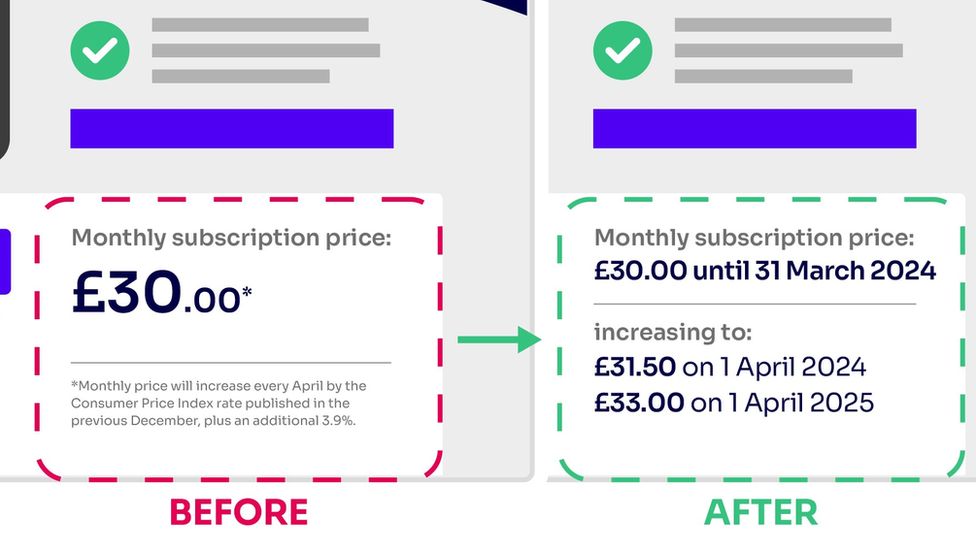This video can not be played
To play this video you need to enable JavaScript in your browser.
Phone, TV and broadband customers must be told about any mid-contract price rises at the point of sale and "in pounds and pence" under new plans.
Telecoms regulator Ofcom said it was concerned contracts were not providing "sufficient certainty" to customers due to many firms including mid-contract price hikes linked to inflation.
The move comes following a review by the regulator in February.
Millions of customers have been hit by bill increases due to high inflation.
Companies often set out in contracts that monthly charges will go up in line with inflation, which is the rate overall prices are rising across the economy.
But high rates of inflation over the course of the past year have pushed up prices by more than in previous years. Ofcom said that, as of April 2023, four in 10 broadband customers and about 36 million mobile customers were on contracts subject to inflation-linked price rises.
The regulator said the practice of imposing an annual rise linked to the rate of inflation, plus an additional hike of 3.9% typically, had become "significantly more widespread" and were "undermining customers' understanding of what they will pay".
It says businesses should outline clearly what payments will increase by during the course of a contract at the point of sale, rather than including an "uncertain future" inflation-linked, or percentage-based, price rise terms.
'Prices need to be crystal clear'
Dame Melanie Dawes, Ofcom's chief executive, said the majority of people were "left confused by the sheer complexity" of current in-contract price rises written into deals.
"At a time when household finances are under serious strain, customers need prices to be crystal clear," she added.
Virgin Media, which recently merged with O2, was the latest company to introduce inflation-linked price rises in May for its landline and broadband services, according to the regulator.
The company hiked prices in step with the Retail Prices Index (RPI) measure of inflation which was 11.3% at the time, as well as an additional 3.9%.
In March, Tesco increased its charges by 10.1%, the Consumer Prices Index (CPI) inflation measure back then, plus the 3.9% additional rise.
BT, Vodafone and EE have also carried out such practices since 2020.
Ofcom said it received more than 800 complaints related to contract price increases between January and October - almost double the amount received during the same period in 2021.

It said customers found it difficult to understand the impact of inflation-linked rises on their payments and did not know what the RPI and CPI inflation rates measure.
"We have provisionally concluded that inflation-linked mid-contract price rise terms can cause substantial amounts of consumer harm by complicating the process of shopping for a deal," Ofcom said.
In response to Ofcom's plans, Virgin Media O2 said it had "always been clear and transparent with our customers regarding any price changes".
"Higher inflation has a significant impact on our own business costs - from energy to equipment. We appreciate that price increases are never welcome, but... it is vital that operators are able to keep investing in the fast and reliable services consumers rely on."
But Ash Schofield, chief executive of Giffgaff, said the mobile network provider agreed with the regulator and was not a fan of inflation-linked price rises during contracts.
"The reality is most people don't read the small print in contracts, and understanding the true financial impact of mid-contract price rises can be confusing," he said.
Vodafone also said it fully supported Ofcom's "ambition to give consumers clarity on contracts".
'People deserve certainty'
Tristia Harrison, group chief executive of TalkTalk, said if Ofcom banned providers from linking in-contract price rises to inflation, then the regulator should also review similar practices for Openreach, which is owned by BT and builds the UK's broadband network, at wholesale level.
"The link between the two is obvious; is essential for protecting both consumers and competition, and needs addressing," she added.
But an Openreach spokesperson said its prices had fallen "for more than a decade as demand for broadband and data exploded" until Ofcom "allowed us to link some of our prices to inflation to give us the headroom to invest in faster, more reliable full fibre broadband throughout the UK".
Ofcom said that although some broadband prices had increased, average costs for internet access and mobile services in the UK had fallen over the past five years, when compared with the rate of inflation.
It said companies had invested in upgrading networks and average speeds, but added that for competition to work in the sector, "consumers must be able to shop around with confidence".
Rocio Concha, director of policy and advocacy at the consumer body Which?, said Ofcom's proposals were a "huge win for consumers".
"With Ofcom calling time on these unfair price hikes, providers must stop this practice immediately," she said.
The regulator will hold a consultation on its proposals until 13 February and plans to publish its final decision in spring 2024.
Related Topics
https://news.google.com/rss/articles/CBMiLGh0dHBzOi8vd3d3LmJiYy5jby51ay9uZXdzL2J1c2luZXNzLTY3NjgwMzI30gEwaHR0cHM6Ly93d3cuYmJjLmNvLnVrL25ld3MvYnVzaW5lc3MtNjc2ODAzMjcuYW1w?oc=5
2023-12-12 14:22:25Z
CBMiLGh0dHBzOi8vd3d3LmJiYy5jby51ay9uZXdzL2J1c2luZXNzLTY3NjgwMzI30gEwaHR0cHM6Ly93d3cuYmJjLmNvLnVrL25ld3MvYnVzaW5lc3MtNjc2ODAzMjcuYW1w
Tidak ada komentar:
Posting Komentar